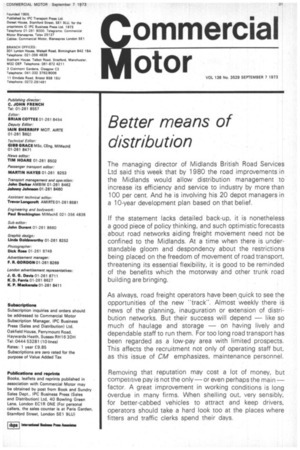Better means of distribution
Page 33

If you've noticed an error in this article please click here to report it so we can fix it.
The managing director of Midlands British Road Services Ltd said this week that by 1980 the road improvements in the Midlands would allow distribution management to increase its efficiency and service to industry by more than 100 per cent. And he is involving his 20 depot managers in a 10-year development plan based on that belief.
If the statement lacks detailed back-up, it is nonetheless a good piece of policy thinking, and such optimistic forecasts about road networks aiding freight movement need not be confined to the Midlands. At a time when there is understandable gloom and despondency about the restrictions being placed on the freedom of movement of road transport, threatening its essential flexibility, it is good to be reminded of the benefits which the motorway and other trunk road building are bringing.
As always, road freight operators have been quick to see the opportunities of the new -track". Almost weekly there is news of the planning, inauguration or extension of distribution networks. But their success will depend — like so much of haulage and storage on having lively and dependable staff to run them. For too long road transport has been regarded as a low-pay area with limited prospects. This affects the recruitment not only of operating staff but, as this issue of CM emphasizes, maintenance personnel.
Removing that reputation may cost a lot of money, but competitive pay is not the only— or even perhaps the main — factor. A great improvement in working conditions is long overdue in many firms. When shelling out, very sensibly, for better-cabbed vehicles to attract and keep drivers, operators should take a hard look too at the places where fitters and traffic clerks spend their days.








































































































































